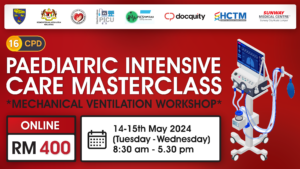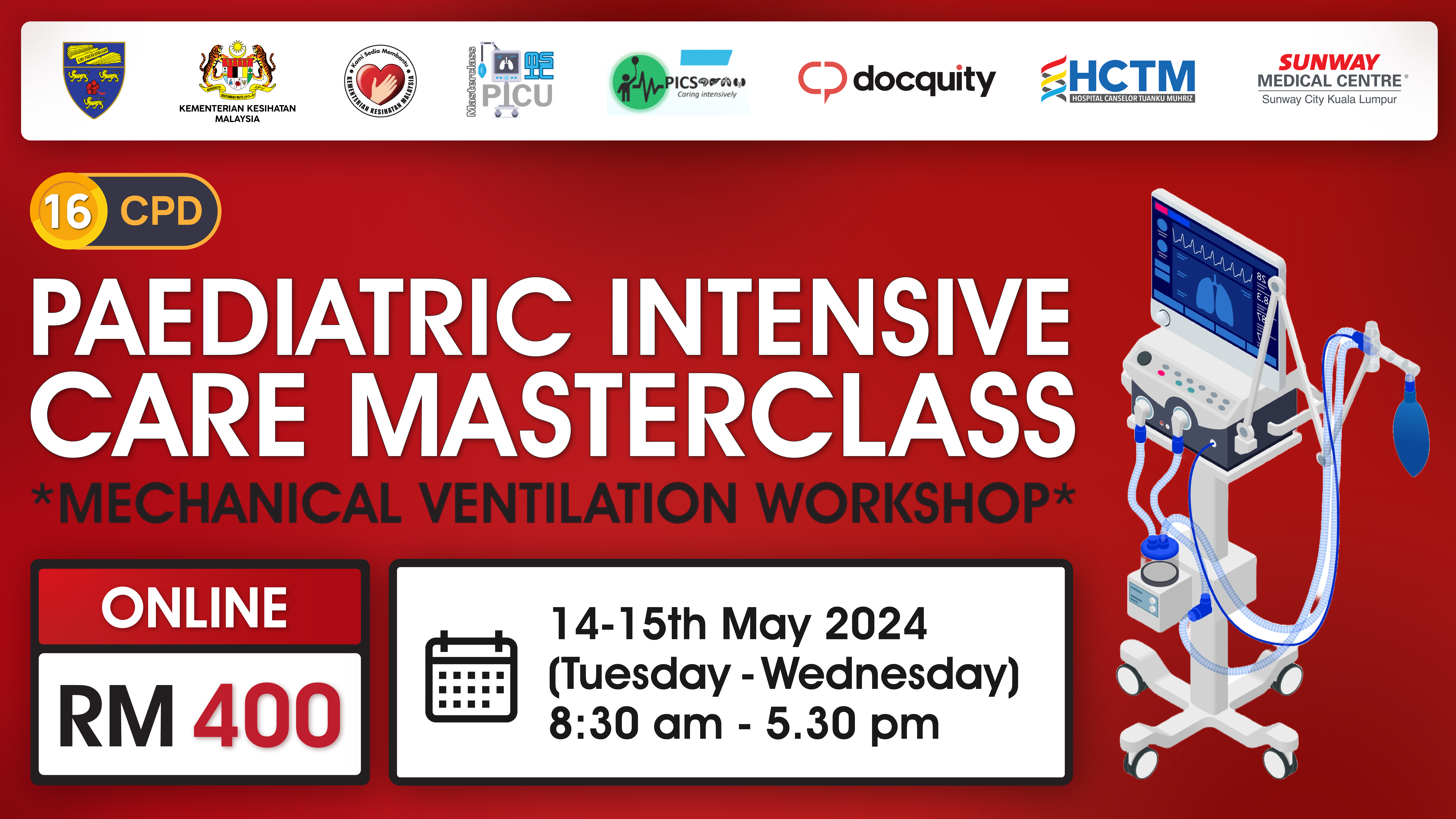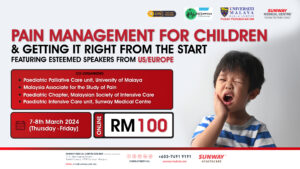
Paediatric Intensive Care Masterclass *Ventilator Workshop*
Paediatric Intensive Care Masterclass *Ventilator Workshop*
Joining the Paediatric Intensive Care Masterclass Ventilator Workshop offers numerous benefits for healthcare professionals seeking to enhance their skills and knowledge in paediatric critical care.

Overview of Paediatric Intensive Care Masterclass Ventilator Workshop course.
The Paediatric Intensive Care Masterclass Ventilator Workshop provides healthcare professionals with a comprehensive training program focused on paediatric critical care ventilation. This workshop offers a blend of theoretical education and hands-on practical experience, guided by experienced clinicians and specialists in the field.
This training is intended for the following participants.
Why they should attend: Paediatric intensivists are at the forefront of caring for critically ill children. Attending this course equips them with advanced knowledge in pain management, enhancing their ability to manage complex issues effectively and improving patient outcomes.
Why they should attend: Paediatric nurses play a crucial role in delivering day-to-day care in critical care units. This course offers them specialized training to better understand and administer pain management in children, ensuring comprehensive and informed patient care.
Why they should attend: Physicians specializing in paediatrics who may encounter critically ill children requiring respiratory support in various clinical settings, including emergency departments, general wards, and paediatric ICUs.
Why they should attend: Paediatric anesthesia requires a specialized and compassionate approach, considering the unique physiological and emotional needs of children. The goal is to provide safe and effective anesthesia while minimising stress and ensuring a positive experience for both the child and their family.
Why they should attend: While respiratory therapists may not directly prescribe pain medications or administer pain management interventions, their expertise in respiratory care can significantly contribute to the overall comfort and well-being of patients, particularly those dealing with pain related to respiratory issues. As part of the interdisciplinary healthcare team, their role complements the efforts of other healthcare professionals in providing holistic patient care.
Why they should attend: As future healthcare providers, attending this course can help medical students and residents build a strong foundation in paediatric care, preparing them for their future roles in healthcare.
Prehospital care providers who may encounter paediatric patients in respiratory distress or respiratory failure and require advanced airway management skills.
What will you learn from this course?
Overview of anatomy and physiology of respiratory system
The anatomy and physiology of the respiratory system work together seamlessly to ensure the exchange of gases necessary for cellular respiration and the maintenance of homeostasis within the body.
The drivers of respiration and Heart lung interaction
The drivers of respiration and heart-lung interaction work in concert to maintain the balance of oxygen and carbon dioxide levels in the body, ensuring efficient gas exchange and optimal cardiovascular function.
Updates in high flow nasal cannula therapy (all types of HFNC)
Ongoing updates in HFNC therapy focus on optimising patient comfort, enhancing efficacy, and expanding its clinical applications across diverse patient populations and clinical settings.
Non-invasive ventilation in children with acute respiratory failure
NIV is an effective and safe therapeutic option for managing ARF in children, offering several advantages over invasive mechanical ventilation. Early recognition of appropriate candidates, proper patient selection, and meticulous monitoring are essential for optimising outcomes and minimising complications.
Respiratory failure and mode of invasive ventilation
Invasive ventilation is a critical intervention for managing respiratory failure by providing mechanical support to the respiratory system. The selection of ventilation mode depends on the underlying pathology, patient characteristics, and therapeutic goals, with the aim of optimising gas exchange while minimising ventilator-associated complications.
Optimising conventional ventilation and lung recruitment
Optimising conventional ventilation and employing lung recruitment strategies are essential components of ventilatory management in patients with acute respiratory failure. Individualized approaches based on patient characteristics, underlying pathology, and response to interventions are key to achieving optimal outcomes.
Ventilation strategies in big black lung
Ventilation strategies in patients with severe coal workers' pneumoconiosis aim to provide effective respiratory support while minimising complications in this challenging population.
Airway and lung ultrasound
Airway and lung ultrasound is a valuable imaging modality for diagnosing and managing various respiratory conditions, providing real-time visualization of lung pathology and procedural guidance at the bedside.
Introduction to APRV, ASV and NAVA ventilation
APRV, ASV, and NAVA are advanced ventilation modes that offer tailored support for patients with diverse respiratory needs. Each mode has unique features and benefits, making them valuable tools in the management of respiratory failure across various clinical scenarios.
The Principle of High Frequency ventilator: The Oscillator & The Jet
These modalities play a crucial role in the management of critically ill patients, providing tailored respiratory support to improve outcomes and enhance patient comfort.
Safe intubation: elective, emergency & difficult airway
Safe intubation requires careful consideration of the clinical context, appropriate preparation, and effective communication among healthcare team members. Whether performing intubation electively, in an emergency setting, or managing a difficult airway, adherence to established protocols, continuous training, and readiness to adapt to changing circumstances are essential for optimal patient outcomes.
Ventilator strategies in congenital diaphragmatic hernia and PPHN: UMMC experience
Ventilator strategies in CDH and PPHN aim to provide effective respiratory support while minimising complications associated with lung injury and pulmonary hypertension. Tailored approaches, including lung protective ventilation techniques and targeted therapies, are crucial in optimising outcomes for neonates with these complex respiratory conditions.
Ventilation strategies during transport of ill patient
Ventilation strategies during the transport of ill patients require careful assessment, preparation, and monitoring to ensure optimal respiratory support and patient safety throughout the journey. By following established protocols, maintaining equipment readiness, and fostering effective communication, healthcare providers can enhance the quality of care and outcomes for critically ill patients during transport.
Ventilation strategies in balancing Qp Qs and other strategies in congenital heart disease
Ventilation strategies in CHD aim to optimise Qp/Qs balance, maintain adequate oxygenation, and minimise the risk of hemodynamic compromise. Multidisciplinary collaboration and individualized patient management are essential to achieve optimal outcomes in this complex patient population.
Management of respiratory secretion
Effective management of respiratory secretions involves a multifaceted approach encompassing hydration, positioning, airway clearance techniques, suctioning, and, when necessary, pharmacological interventions.
Weaning of ventilation
The weaning of ventilation is a gradual process that requires careful assessment, monitoring, and collaboration among healthcare providers.
What did the participants say about this course?
Attending the Paediatric Intensive Care Masterclass course was a game-changer for me. The comprehensive curriculum equipped me with practical strategies to assess and address pain effectively. Looking forward to more courses from Docquity.

Dr. Chai Wai Loon
Know your instructor
Instructors for the "Paediatric Intensive Care Masterclass *Ventilator Workshop*" webinar are an esteemed panel of 13 highly experienced doctors who bring a wealth of knowledge and expertise in Paediatric Intensivists. With backgrounds in various specialties, they collectively offer a comprehensive perspective on pain management for paediatric patients. Rest assured, you will be learning from the best in the field, ensuring a rich and insightful educational experience.
Frequently Asked Questions




